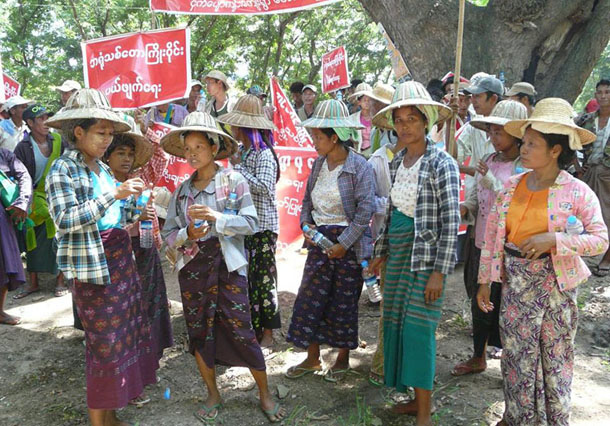An opinion piece by Sean Bain, ICJ Legal Consultant in Myanmar.
In August, Myanmar’s newly elected Government overhauled the senior figures heading the administrative framework for governing Special Economic Zones.
Union Vice-President Henry Van Thio replaces former president Thein Sein as Chairperson of the SEZ Central Body, responsible for determining policies to promote foreign investment and rapid economic growth through the creation of SEZs.
One of his first tasks will be to select members for the SEZ Management Committees.
Each SEZ has a Management Committee with an extensive mandate to prepare development plans, propose projects, facilitate investment approvals and, crucially, coordinate resettlement for people displaced by projects in SEZs (picture).
Above these committees is the Central Working Body, where senior officials scrutinise project plans and develop policy advice for implementation. At the top sit the Union Ministers who make up the Central Body.
With the exception of the Thilawa Management Committee, these bodies have been inactive since the change of government in April.
The selection of Management Committees is an opportunity to appoint members who have a good knowledge of human rights law and environmental protection as well as investment law.
And to only select persons who are not tainted by corruption. This will be important to help ensure projects conform to human rights obligations and environmental laws.
And because the legal framework established by the 2014 SEZ Law is not clear enough to be administered in a straightforward manner.
Research by the International Commission of Jurists and others has found that Management Committees implementing SEZs have failed to protect the rights of people whose homes, land and livelihoods have been adversely affected by Myanmar’s three SEZs in Dawei, Thilawa and Kyauk Phyu.
In each SEZ, affected persons have been denied the right to access information about project plans, which the government failed to make transparent.
A lack of meaningful consultation has contributed to poor planning for resettlement, resulting in inadequate arrangements for compensation and livelihoods.
The impact for many has been deterioration in living standards. Under international law, the failure to protect people from deterioration in living standards generally amounts to a violation of rights to food, health and adequate housing.
The human right to an adequate standard of living is enshrined in the International Covenant on Economic, Social and Cultural Rights – which Myanmar has signed and is taking steps to ratify.
International standards, such as the World Bank Policy on Involuntary Resettlement, affirm that people displaced by development projects should be assisted to improve or at least restore their livelihoods to pre-displacement levels.
Management Committees have played a central role in managing the resettlement of communities affected by Myanmar’s SEZs.
But this role is not recognized in law, so there is no formal accountability in cases where committee members fail to protect the rights of affected communities.
Consider for example the provisions guiding the resettlement of people living in the SEZ area.
Article 80 of the SEZ Law requires companies to cover resettlement costs associated with their projects and to ensure that a displaced person’s living standards do not deteriorate.
With the Management Committee, the company should ‘coordinate…as necessary’, but under this Law the responsibility falls on the company, which does not have the protective human rights obligations of the State.
The Management Committee may be directing the process but the company could be held financially liable for substandard implementation.
Article 82 of the SEZ Law requires the Ministry of Home Affairs to take responsibility for land acquisition – another critical stage of any resettlement process.
But the Law does not clarify how the Ministry is to interact with the Management Committee and companies.
Overlapping duties among these actors has meant that duty-bearers are unsure of their duties while rights-holders are largely unaware of their rights.
To add to the confusion, the Law does not specify which of Myanmar’s more than 50 overlapping and conflicting land laws, each with different compensation arrangements, shall apply in SEZs.
This gives rise to inconsistent application of the law both within and across SEZs. A new land law based on the 2016 National Land Use Policy would help clarify this messy legal framework.
The lack of clarity regarding the role of the Management Committees reflects the general problem of uncertainty in many aspects of the SEZ Law, which is often vague, creating uncertainty about the roles and duties of different parties and worrying some investors.
Of particular concern to local residents is that the Law contains three chapters on investor’s benefits but does not mention human rights at all.
By assigning vague powers to authorities while omitting protections for affected communities, the Law codifies power imbalances in Myanmar.
This imbalance is aggravated by the general lack of accountability and access to justice for victims of human rights abuses in Myanmar.
The SEZ Law should be amended to clarify the duties of Management Committees including its obligations to respect, protect and fulfil human rights.
Investment revenues from SEZs should finance increased resources for the commissions and departments responsible for enforcing human rights and environmental standards.
These amendments are consistent with the government’s priorities of economic development in line with land rights, and should be considered before approving new investments in SEZs.
Reforming the SEZ Law would be a critical step toward ensuring that rights violations in SEZs are not repeated under the NLD’s watch.
In the meantime, the performance of SEZ Management Committees will significantly impact upon the ability of the Government to uphold its State duty to protect human rights and provide access to remedy for those living in the SEZ areas.
The Central Body must choose Management Committee members carefully.

